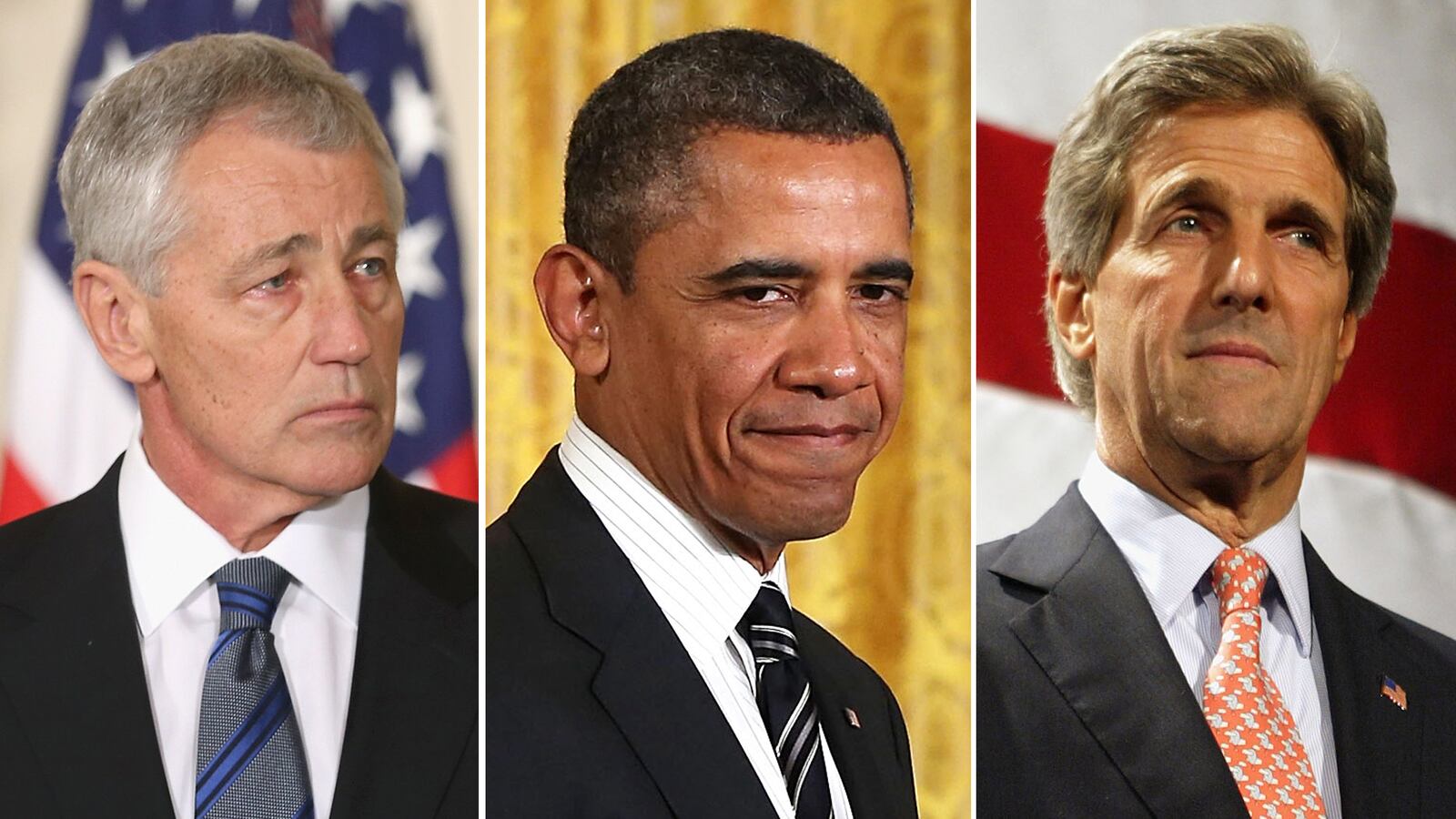
When he first ran for president, one of Barack Obama’s chief assets was said to be his age: specifically, that he was not a member of the Vietnam generation, and could therefore transcend America’s seemingly endless cultural clashes over the legacy of that war. “There’s a generational issue. The president’s conception of power is not founded on Vietnam,” his deputy national security adviser told James Mann a year and a half into the administration. “This is the first president who’s not trying to justify himself in the context of that very tumultuous period.”
Which makes it all the more bizarre that Obama has now nominated John Kerry and Chuck Hagel, two of the public figures most defined by Vietnam, to be the faces of U.S. foreign policy. Kerry first grew famous as a spokesman for Vietnam Veterans Against the War, while Hagel turned into a visceral critic of George W. Bush as he reappraised his own experience in Vietnam. If they are confirmed, the ghosts of Vietnam will once again be front and center in the nation’s foreign policy—and it will be a post-boomer president who has placed them there.
What does it all mean? One possibility is that Obama, having once shunned Vietnam analogies, has reluctantly come to see America’s situation as quite analogous to that war. While reassessing his Afghanistan surge, Obama reportedly drew on lessons presented in a Vietnam history called Lessons in Disaster—which catalogued the war’s bureaucratic mistakes and argued that, had he survived and won reelection, President Kennedy would have withdrawn American troops or sought a negotiated settlement because he would not have had “to prove himself in Vietnam.” According to Bob Woodward’s Obama’s Wars, Obama also listened to arguments from advisers like Richard Holbrooke and Joe Biden that the wars were significantly parallel. (Obama was irked by Holbrooke’s comparisons but read Lessons, which Holbrooke had reviewed for The New York Times.) And several observers have reported that, at an off-the-record dinner, Obama told historians Robert Caro and David Kennedy that he fears ending up like Lyndon Johnson: his great domestic achievements undermined by war overseas.
Another possibility is that Obama’s selection of Kerry (69) and Hagel (66) points to a generational hole in Democratic foreign-policy circles. Many of the younger staffers who crafted the “new thinking” in Obama’s first-term foreign policy—the ones Mann calls “the Obamians”—apparently require additional seasoning before they can be nominated to a cabinet-level post. At the Pentagon, for example, Obama appears to have had few short-list options besides Hagel; the chief criticism of Michele Flournoy, the main alternative (who came of age after the Vietnam war had ended), seems to be that she needs a few years’ extra experience running a large organization.

A third possibility is that the picks say less about Kerry’s and Hagel’s formative experiences than they do about the president’s. Kerry was an early Obama supporter in 2008 (he championed Obama over Hillary Clinton), while Hagel gave the impression that he supported Obama via his wife’s endorsement. Perhaps the president is simply rewarding two men he perceives as having been loyal to him.
Of course, there is no such thing as a “Vietnam veteran’s perspective” on U.S. foreign policy. John McCain does not agree with Chuck Hagel, who does not always agree with John Kerry. For instance, Kerry was more hawkish than Obama on Libya, while Hagel has said the intervention harmed our diplomatic efforts with Iran. (Disclosure: I’ve interned for the Senate Foreign Relations Committee, chaired by Kerry.) And given that Obama prefers to control foreign policy from the White House, where he and many of the “Obamians” call the shots directly, it’s nearly impossible to predict what role either secretary might play in a given crisis.
It’s also true that it’s hardly unusual in American history for veterans to take on prominent foreign-policy jobs many decades after their wartime service ends. The last Civil War veteran to head the War Department did so in 1909, while the last World War II vet to head State was Warren Christopher, in 1997.
Nevertheless, what makes the Kerry and Hagel nominations noteworthy is the considerable degree to which the two men were influenced by their war experiences (it never seemed that Warren Christopher’s worldview had been especially shaped in reaction to World War II)—as well as the clear steps Obama and his advisers previously took to distance themselves from the legacy of the Kerry-Hagel generation. Obama’s administration was supposed to be the first since the 1960s to make decisions unaffected by memories of Vietnam. “It’s not like this ghost in his head,” national security speechwriter Ben Rhodes told Mann. Now, just a few years later, the ghosts are stocking the cabinet.






